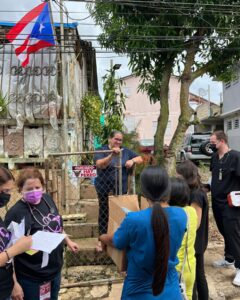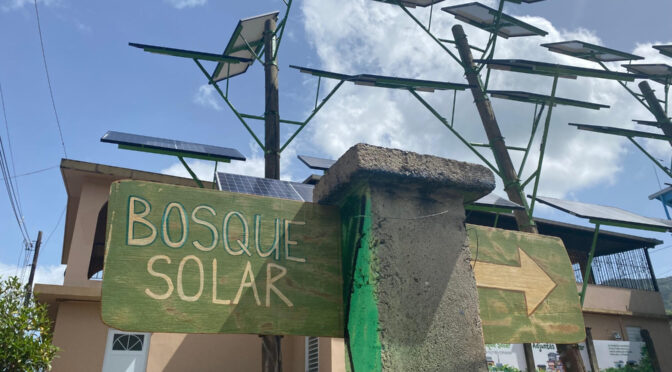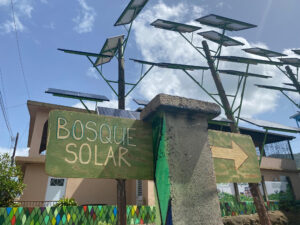Self-governance initiatives for environmental and energy justice in Puerto Rico
By Francis Russell
Introduction
Adjuntas is a small municipality in the subtropical mountainous zone of south-central Puerto Rico. It has historically had strong ties to both agricultural and Indigenous traditions and has relatively high poverty rates. Casa Pueblo, a family-created environmental justice NGO headquartered in the town center, has been instrumental to the resilience of the community in resisting exploitation and sustaining traditional livelihoods since 1980. They have advocated for the ecological preservation of this zone and succeeded in halting resource extraction in the area, most notably the large-scale public-private plans for open pit mining in the 1980s. Since then, they continue to host educational programs, manage forest preserves, run a radio station, participate in political protests, push for self-sufficient community economies through agrotourism and coffee production, and, more recently, produce solar energy.
Casa Pueblo gained international attention after Hurricane María in 2017 for their ability to provide energy in the town center of Adjuntas and broadcast radio communications identifying resources just one day after the hurricane. In contrast, virtually all other mountain communities were stranded without power for up to several months since many roads and bridges connecting these communities to larger coastal cities were blocked by landslides and fallen trees. However, recent changes have made power outages more common regardless of weather conditions. After Hurricane María destroyed much of the infrastructure including the state-managed electrical grid, politicians and private entities used the destruction as an opportunity to privatize the grid in 2021. Since the change, consumers have noted more frequent power outages and even higher costs of electricity.
Analysis
In the wake of Hurricane Fiona that impacted the island on September 19th, 2022, many communities remained without power several weeks later. Once again, the state’s incompetence forced Casa Pueblo to rely on self-governance tactics to provide energy and resources for its community in Adjuntas. They served as a charging hub, broadcast other community resources on their radio station, provided over 2,000 solar lamps to residents, hosted several medical clinics, and held movie screenings in their solar cinema for children and families in the area. There is a saying throughout Puerto Rico that is especially common after natural disasters: “solo el pueblo salva al pueblo / only the people can save the people.”
The case of Casa Pueblo thus illustrates how neoliberal governments defer to NGOs and activists to fill the “cracks” left in the place of centralized infrastructure and social services (Roy, 2006). This is a prime example of the “self-responsibilization of the neoliberal subject,” in which a government places the responsibility of development and social organization on the citizens themselves (Sletto & Nygren, 2016, 966). Instead of ensuring reliable and affordable electricity for all residents, the Puerto Rican and US government have prioritized partnering with private interests, minimizing infrastructure costs, and maintaining a commitment to fossil fuels.
As a result, six years after Puerto Rico experienced its worst hurricane to date, the neoliberal government and the Fiscal Oversight and Management Board of the US have still not prioritized the concerns of the people. Puerto Rico needs a flexible electrical grid that can withstand storms, reduce the number of blackouts, and lower already high costs of living. Local and federal actors have turned over the distribution of one of the most vital resources to a private entity with no connection to the island itself. According to the current director of Casa Pueblo, Arturo Massol, making energy production and transmission accessible and sustainable would require implementing renewable energy. In a recent survey of 60 Adjuntas residents conducted by Casa Pueblo one month after Hurricane Fiona, 84% of respondents said solar power in their home would have helped them post-hurricane. However, as Massol frequently mentions, enabling individuals and communities to create their own energy through renewable infrastructure disrupts the profit-driven goals of electrical companies. According to the director, Casa Pueblo’s “real aspiration is eventually not to need the solar lamps; we want the whole system to be solar, so we can store energy in batteries that we rely on in the dark days during and after a storm…We also want to capture the water that falls, so we don’t have to rely on power for water. We want to collect it, cap it, and use it” (Babic, 2022).
Implications
Community organizations like Casa Pueblo can offer paths to resistance and liberation through their responses to clear failures in state infrastructure. In their study on civic initiatives in an informal settlement in Accra, Ghana, Nunbogu et al. (2018) show how self-governance mechanisms enable underserved communities to better adapt to changing circumstances. In the context of Adjuntas, where infrastructure is fragile and natural disasters occur frequently, having methods of adapting quickly to the subsequent failures of state recovery efforts is vital for these communities. Casa Pueblo is a case of resilient community response in the face of neoliberal governments that force citizen participation and responsibilitization. Further, Casa Pueblo has spearheaded a self-governance energy movement that could gain enough traction to receive state support and recognition.
Casa Pueblo’s self-governance tactics have allowed them to better support their community not only by creating innovative solutions to infrastructure failures, but also by eliciting political change. In the past, Casa Pueblo successfully leveraged enough public support for their anti-mining campaigns to stop large-scale ecological and social exploitation in the region. Dovey et al. (2019) argue that organizing communities around a central cause can “produce power” for communities that otherwise go underserved (279). Creating public narratives around groups actively accomplishing the work of the state themselves can spur political change (Dovey et al., 2019). Thus, with enough buy-in from the local and international community and continued pressure on political leaders, I believe Casa Pueblo’s renewable energy justice efforts will be integral to solving the current electricity crisis in Puerto Rico.
More broadly, this case clearly illustrates the people’s power to assist their own communities even when left behind by neoliberal governments. As Miraftab (2009) writes, marginalized citizens in the Global South are doing planning work every day despite not being “planners” in the form of a paid profession. Miraftab (2009) describes this as insurgent planning, or planning that does not limit itself to the confines of formal structures, invited channels, and at times, legality. Casa Pueblo suggests that these forms of insurgent planning that clash with assumed logical neoliberal models of governance can offer paths to resilience, self-sufficiency, and potential political change.
Bosque solar. Source

Clinic and lamps. Source

Casa Pueblo building. Source

